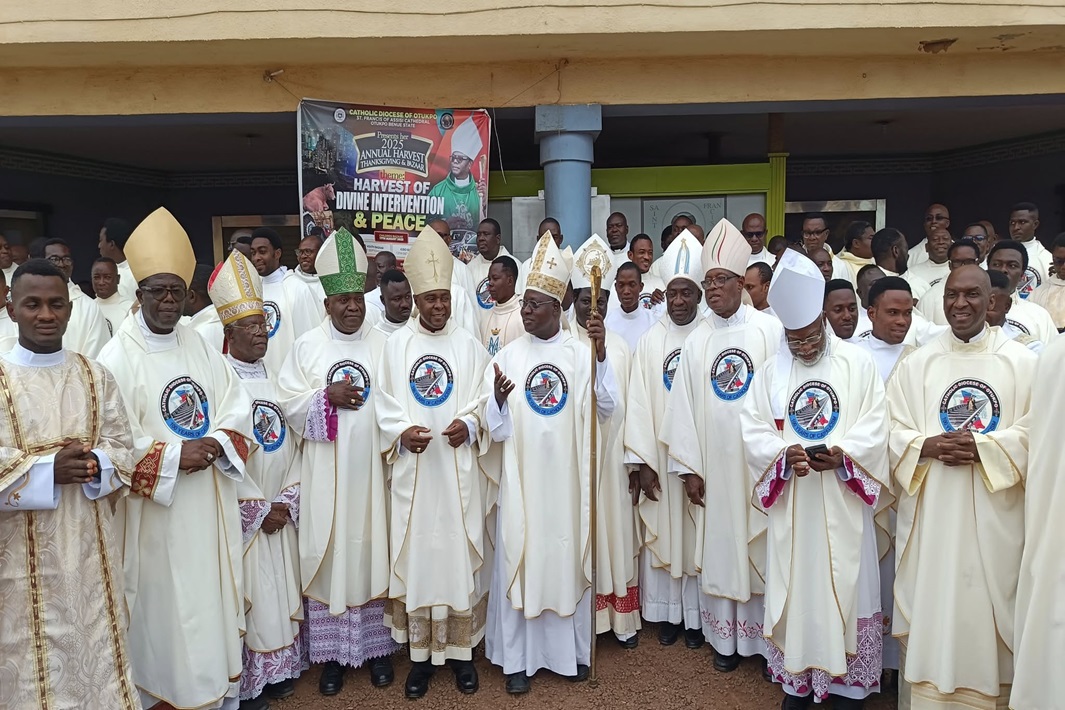By Paschal Norbert
OTUKPO, AUGUST 22, 2025 (CISA) – Catholic Bishops of the Abuja Ecclesiastical Province have strongly reiterated the Church’s prohibition against priests engaging in partisan politics, warning of severe canonical penalties for disobedience, while also raising alarm over worsening insecurity, economic hardship, and the proliferation of strange religious sects in their jurisdiction.
The bishops made their position known in a communiqué issued at the end of their three-day provincial meeting held from August 19–21, 2025, at the newly constructed Bishop’s House in Akpegede, Otukpo Diocese.
In their strongest warning yet against clerical involvement in politics, the bishops declared:
“Once again, we would like to express the position of the Church in the involvement of the priest in politics. Canon 285.3, and canon 287.2 of the 1983 code discourages Catholic clergy from holding political office. We join our voices with the rest of Nigerian bishops on the statement issued in October 1, 2024, entitled, ‘On Clerics Actively Engaging in Partisan Politics.’ The document highlights that a cleric who has violated these canons notwithstanding the appeals and two canonical warnings of his proper Ordinary … and who has given no sign of reform must be suspended.”
They further warned that priests who persist in political activity risk dismissal from the clerical state, adding, “This prohibition applies also to the religious (cf. Canon 285.3, and Canon 287.2).”
The bishops expressed deep concern over incessant violence that has rocked parts of Benue State and other areas within the province, lamenting devastating attacks on Catholic parishes and entire communities.
“We continue to have sleepless nights over the persistent insecurity in our province. We regret the loss of lives and property and pray for a peaceful society,” the bishops said.
They pointed to the June 14 massacre in Yelewata Community, Guma LGA, Benue State, in which over 200 people were killed and at least 3,000 displaced, describing it as a “barbaric armed terrorist attack.”
The bishops also condemned the August 11 burning of the priest’s residence and parish facilities at St. Paul Parish, Ayetwar, in Katsina-Ala Diocese, allegedly by armed Fulani militia.
“This violent attack … has shut down the entire activities of the parish,” they said, warning that unchecked violence, kidnappings, poverty, and church closures were leaving the faithful in despair.
Turning their attention to priestly formation, the bishops pledged continued investment in seminaries but noted that economic hardship is making it difficult to sustain the quality of formation needed.
“We need priests who are holy, sound and with good character,” the bishops emphasized, stating “We also cannot get tired of commending the sacrifice made by formators in the formation of quality priests. Correspondingly, we call on our seminarians to use their precious time during formation to adequately prepare themselves for the herculean task of mission ahead of them in our fast-changing world.”
They appealed to the laity to continue supporting seminaries despite the “unabated devaluation of our currency.”
In their communique, the bishops also issued a stern warning about the rise of unregulated pious unions and questionable sects operating under the guise of Catholic spirituality.
“While it is not in our powers to strangulate the promptings of the Holy Spirit, it is our obligation to guide and redirect such promptings,” the communiqué read.
The bishops warned, “We have noticed the proliferation of many religious sects for whatever name they are called. We maintain that if these sects are not seen in union with the Roman Catholic Church, it suggests that anyone who identifies with them does so at their risk.”
They directed pious groups to restrict the wearing of religious habits to exclusive congregational programs only.
